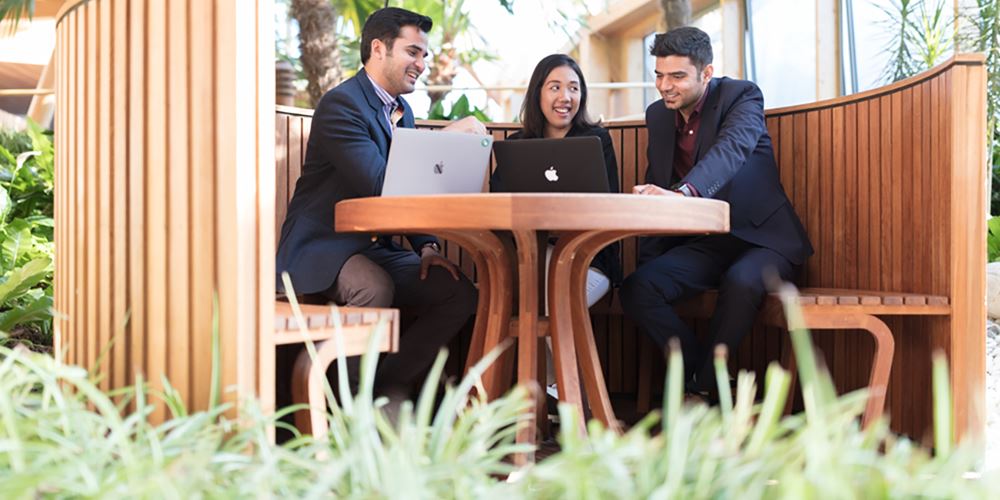Sustainable Operations: An Essex MBA Essential

Marco Nowinksi is a visiting lecturer at Essex Business School. He leads the Sustainable Operations module on our MBA programme. In this blog, he explains why knowledge of sustainable operations is an essential skill for an MBA and looks at the ways in which online learning can have a positive impact on the student learning experience.
I have been teaching on The Essex MBA since 2018 and enjoy leading the Sustainable Operations module. With a background in production and quality management, for the last 25 years I have been advising global organisations on operations strategy and management. In addition, for over 10 years, I have acted as a visiting lecturer at various international business schools, bringing my practical knowledge to the classroom and combining it with research-based models and frameworks to help business students get a full understanding of the impact that operations management has on the performance of organisations.
Sustainable operations – an MBA Essential
The Sustainable Operations module is part of the MBA Essentials, a group of eight core modules that we believe make up the essential knowledge and skills needed by tomorrow’s leadership teams. Sustainable Operations equips our students with the skills they need to manage operations in a way that helps deliver the ‘triple bottom line’: success for people, planet and profit. We introduce models that help students to manage a range of operations, from high volume mass processes to low volume bespoke businesses.
Operations used to be rooted in the manufacturing industries, but in today’s business world we have seen a massive shift to service operations. Still, the underlying principles of operations management apply equally and we give special attention to how service-based businesses benefit from excellence in operations management. We are not just focusing on running factories efficiently, but on all activities in the value chain for the delivery of products and services to ever more demanding customers.
The importance of Operations Management
'Operations may not run the world, but it makes the world run' writes Professor Nigel Slack in the foreword to his excellent textbook 'Operations Management'. With the events of the last months, we have seen the serious impact Supply Chain Management has on how the world runs.
In fact, many CEOs of the world's leading companies have started their executive careers as operations managers and Chief Operating Officers (COOs). Tim Cook served as Executive Vice President (EVP) of Worldwide Sales and Operations and was COO until he was named CEO of Apple in 2011. Mary Barra, CEO of General Motors (GM), was EVP of Global Product Development, Purchasing and Supply Chain, responsible for the design, engineering and quality of GM, prior to becoming CEO.
Keep an eye on Alicia Boler Davis. FORTUNE magazine just put her on the 2020 list of the 'Most Powerful Women', ranking #12. She joined Amazon in April 2019 as vice president of global customer fulfilment. Now she runs the company’s hundreds of warehouses worldwide, overseeing employees, logistics, and processes, as well as technology. She brings years of operations experience, having been VP for global quality and U.S. customer experience at GM since 2012, following successful years in manufacturing and engineering positions at the firm.
According to Carlos Cordon, LEGO professor of supply chain management at IMD, one of the main reasons students take operations classes, is the fact that operations is required for top executive roles. “Businesses look for executives that have a holistic understanding of the business," states Cordon.
Operations management also puts MBAs into close contact with new technology. Many are fascinated by the innovations made possible by operations management – whether it’s electric cars from Tesla, blockchain technology for food traceability, fast package delivery from Amazon or running an environmentally responsible business, using renewable energy to reduce the operations impact on the environment. I regularly get feedback from my students that the Sustainable Operations module on the Essex MBA really helped them to do their jobs better. The practical nature of the subject puts the learning experience right into the context of their work.
Online learning during COVID-19 and the ‘flipped classroom’ model
This year, in light of the COVID-19 pandemic, I have taught this module wholly online. First, I was a bit worried that the experience would be less engaging. However by using breakout rooms, online quizzes, short videos and learning material on Moodle (the University of Essex’s virtual learning platform) as well as a dedicated course website, we had great interaction with students. Their participation was amazing and the online quizzes even made it possible for quieter students to actively contribute.
From October 2021, each Essex MBA module will be delivered in a one-week period using the flipped classroom model. Students will start each module by exploring a set of learning resources on Moodle. They will be able to work at their own pace to gain the basic knowledge that underpins the module. Next they’ll come to campus to attend a series of workshops where they will apply their learning, explore case studies, leverage their skills and prior experience and work with peers. Finally, they take part in a group meeting with our MBA faculty, so they get all the support they need for the assessment of the module and submission of their assignment. This year‘s 'blended learning' approach has reassured me that the model has the potential to be very effective, as well as offering fantastic flexibility for part-time students, managing their MBA around their work commitments.
Marco Nowinski, Visiting Lecturer, Essex Business School
Find out more about The Essex MBA
